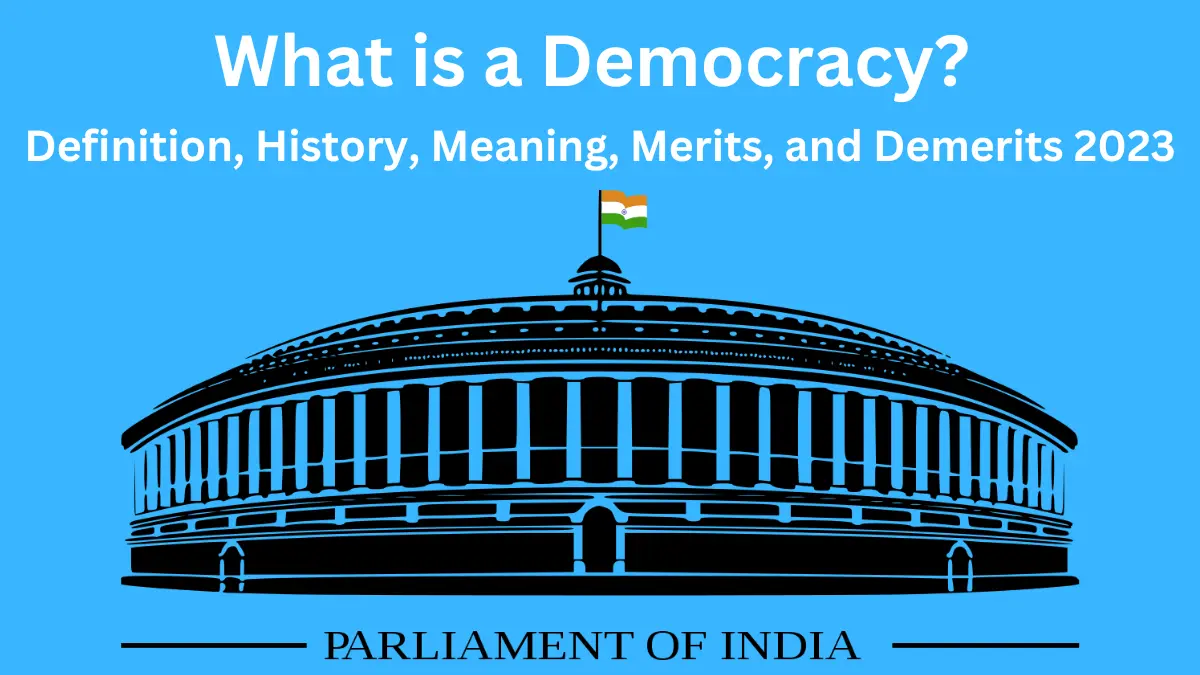What are the merits and demerits of democracy?
Explore What are the merits and demerits of democracy? Gain profound insights into its impact on society and governance.
What is a democracy, why democracy is important, what is a democracy, the importance of democracy, types of democracy, the meaning of democracy, the definition of democracy, and what is democracy. Definition, history, meaning, merits, and demerits 2023
Introduction: What are the Merits and Demerits of Democracy?
Democracy, a political system that values the voices and choices of the people, has long been hailed as a beacon of freedom and equality. In this exploration of “What are the Merits and Demerits of Democracy,” we delve into the profound advantages and challenges that come with this form of governance.
On one hand, democracy celebrates the power of the citizenry, fostering transparency, accountability, and the protection of individual rights. It allows for peaceful transitions of power, encourages diverse perspectives, and strives to represent the interests of the majority.
However, the very essence of democracy also presents its own set of complexities. From the risk of majority tyranny to the potential for sluggish decision-making, we’ll uncover the demerits that can arise when the democratic ideal encounters real-world challenges.
What is a Democracy – Why Democracy is important?
The English synonym of democracy, ‘Democracy‘, is made up of two words from the Greek language ‘Demos and Cretia. Which means “power to rule”. In this way, democracy can be called a system of governance in which people participate in some form of governance, many definitions of democracy have been given by different scholars, and some of the main ones are as follows.
According to Abraham Lincoln
Democracy is of the people for the people and by the people According to Sile – Democracy is the form of government in which every person is a part of the part According to Lord Bryce – ” From the time of Herodotus, democracy means that government It is understood from the system that the power of governance of the state in the country is not in the hands of a specific class or classes, Varuna remains in the hands of the entire caste.
READ ALSO:-
डिजिटल मार्केटिंग क्या है | What is Digital Marketing in Hindi
What is Pay on delivery on Amazon?
ब्लॉगिंग कैसे शुरू करें – How To Start Blogging In Hindi 2023?
Which is the best free template for Blogger?
तनाव (stress) क्या है और इसे कैसे कम करें | Define stress and how to manage it?
Definition of Diacy
In a democracy, power is decentralized, and all the power is vested in the hands of a large section of the people. According to Professor Garner – Democracy is government and government which is composed and managed on the principle that every adult citizen who is not disqualified by reason of punishment for a crime or because of his illiteracy in some countries, at least those persons take part in the elections of the State by whose laws he shall be governed and the value of one vote shall be equal to the vote of each other in any other election.
He comes to the conclusion that democracy is a government that is owned by the people and has not been imposed on them by any customer power. The government is a democratic government, a democratic and aristocratic system, even a dictatorship addresses itself by the name of the government of the people.
YouTube Video What Is Democracy | What are the merits and demerits of democracy?
What are the Merits of a Democracy?
Merits of a democracy include:
- Political Equality: In a democracy, all citizens have an equal right to participate in the decision-making process, regardless of their background or social status.
- Protection of Rights: Democracies typically have strong legal systems and constitutions that protect the rights and freedoms of individuals, such as freedom of speech and the right to a fair trial.
- Peaceful Transitions of Power: Democracies often facilitate peaceful transitions of power through regular elections, reducing the likelihood of violent conflicts over leadership changes.
- Accountability: Elected officials are accountable to the people, as they can be voted out of office if they fail to meet the expectations of their constituents.
- Innovation and Creativity: Democracies tend to encourage innovation and creativity because they allow for diverse perspectives and ideas to be heard and considered.
- Stability: Democracies can be more stable because policies and decisions are made with broad input and consensus, reducing the chances of radical or abrupt changes.
- Protection of Minority Rights: Democracies often include mechanisms to protect the rights of minority groups, ensuring their voices are heard and their interests are safeguarded.
- Economic Prosperity: Many democracies have strong economies due to factors like the rule of law, property rights, and a conducive environment for business.
- Social Welfare: Democracies often have social safety nets and welfare programs aimed at reducing inequality and helping those in need.
- International Cooperation: Democracies tend to cooperate more peacefully with other democracies, contributing to global stability and peace.
It’s important to note that while democracies have these merits, they also face challenges and can vary widely in their effectiveness and implementation.
What are the demerits of a Democracy?
Democracy, while often considered one of the most desirable forms of government, is not without its potential drawbacks. Some of the demerits or challenges associated with democracy include:
- Slow decision-making: Democracy can sometimes result in slow and cumbersome decision-making processes, particularly in large and diverse societies. Extensive debates, negotiations, and checks and balances can lead to delays in addressing critical issues.
- Tyranny of the majority: In a pure democracy, there’s a risk of the majority suppressing the rights and interests of minority groups. This can lead to inequality and discrimination against minority populations.
- Populist politics: Democracy can encourage politicians to adopt populist policies to gain popular support, even if these policies are not in the best long-term interest of the country.
- Short-term focus: Elected officials may prioritize short-term goals to win re-election, potentially neglecting important long-term issues such as climate change or fiscal responsibility.
- Inefficient bureaucracy: The bureaucracy in democratic systems can become inefficient and prone to corruption, as political patronage and favoritism may influence appointments and promotions.
- Polarization and gridlock: Democracies can suffer from political polarization, leading to gridlock in legislatures and an inability to pass meaningful legislation.
- Voter apathy and ignorance: In some democracies, voter turnout can be low, and citizens may lack the knowledge to make informed decisions, potentially leading to suboptimal outcomes.
- Vulnerability to demagogues: Democracies can be susceptible to charismatic leaders who manipulate public opinion and undermine democratic institutions.
- Economic challenges: Democracies can struggle with managing economic issues, as populist policies or political pressures may interfere with sound economic decision-making.
- Complexity and cost: Conducting elections and maintaining democratic institutions can be expensive and complex, requiring significant resources.
It’s important to note that these are not inherent flaws of democracy but rather challenges that democracies need to address and manage. Many democracies implement various mechanisms and safeguards to mitigate these demerits and promote better governance.
Evaluation of Democracy
Both the supporters and critics of democracy are in number, some consider it to be the best system of governance and some consider such inefficiency to be nutritious, so it is necessary to consider the merits and demerits of democracy.
Faith in a Democracy
Modern liberalism considers democracy as the best system of governance in comparison to other systems of governance. In a democracy, the rulers can be changed easily and democracy protects the rights and freedoms of the people.
YouTube Video What Is Democracy | What are the merits and demerits of democracy?
Defects of a Democracy
Foster of inefficiency – This concept is strongly criticized by many scholars of the belief that each person has equal capacity to rule as others. should
Similarly, Aristotle has expressed the view that only a few people have the ability to govern, and the rest have only the ability to be governed. The ability to understand problems is equal to nothing else in him.
That’s why the critics said that democracy is a government by fools for fools. Radical partisanship is found in the democratic system.
Apart from this, which is often false, political parties promote porridge devotion in place of patriotism, moral values are expected in democracy – different candidates throw mud at each other at the time of elections, spread false propaganda, and Use all kinds of tricks to get the victory.
People are misled by sly and selfish politics, truth is strangled, and immoral methods are adopted. The dictatorship of the majority – Democracy is the rule of the majority. ) He adopts a dictatorial stand and starts atrocities on the minorities.
READ ALSO:-
Google Pay Launched New Service
Lovely Facebook Stylish Names 2023
How to start event blogging and earn money
Pc Part Picker for building Your own Computer | Pc Part Picker in Australia
Conclusion
In conclusion, “What are the merits and demerits of democracy” is a critical question that requires careful consideration. Democracy, with its merits of fostering individual freedoms, promoting accountability, and encouraging civic participation, stands as a beacon of governance. It empowers citizens to have a say in their government and contributes to political stability.
However, democracy is not without its demerits. It can lead to gridlock and inefficiency, and the tyranny of the majority may threaten the rights of minority groups. Additionally, the electoral process can be vulnerable to manipulation and misinformation.
In the end, the merits and demerits of democracy are not fixed but evolve with time and context. It is incumbent upon us to continually assess and refine democratic systems to maximize their benefits while mitigating their drawbacks, ensuring a government of the people, by the people, and for the people to endure and thrive.
FAQ’s
What are the merits of democracy?
Democracy promotes individual freedom, protects human rights, and allows citizens to participate in decision-making.
How does democracy encourage political stability?
Democracy provides a peaceful means for the transfer of power through elections, reducing the likelihood of political upheaval.
What economic benefits does democracy offer?
Democracy often leads to economic stability and growth by fostering a conducive environment for investment and entrepreneurship.
How does democracy ensure accountability?
In a democracy, leaders are accountable to the electorate, and regular elections enable citizens to hold their representatives responsible for their actions.
What role does diversity play in a democratic system?
Democracy celebrates diversity and ensures representation for various ethnic, religious, and social groups, promoting inclusivity.
What are the demerits of democracy?
Democracy can be slow in decision-making, prone to populism, and may lead to short-term policies driven by electoral cycles.
How does democracy handle the potential for majority tyranny?
Democracy includes safeguards such as a constitution and an independent judiciary to protect minority rights from the tyranny of the majority.
What challenges does democracy face in terms of corruption?
Democracy can struggle with corruption as the pursuit of power and influence may lead to unethical behavior among politicians.
Is there a risk of instability in young democracies?
Yes, newly established democracies may face instability as they grapple with building democratic institutions and ensuring the rule of law.
Can democracy lead to gridlock in government?
Yes, the need for consensus and compromise in a democratic system can sometimes result in legislative gridlock, making it difficult to pass important reforms.


